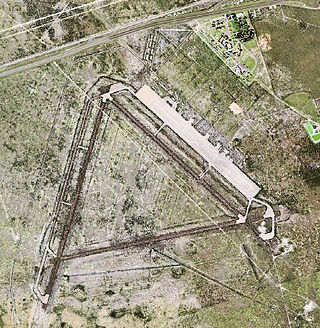
Pyote Air Force Base was a World War II United States Army Air Forces training airbase. It was on 2,745 acres (1,111 ha) a mile from the town of Pyote, Texas, on U.S. Highway 80, 20 miles west of Monahans,` 230 miles (370 km) east of El Paso.
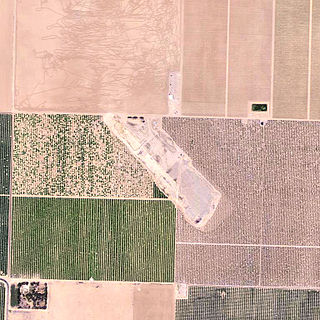
Gardner Army Airfield is a former United States Army Air Force World War II Field located 9 miles southeast of Taft, California. It was named for Major John H. Gardner, a World War I aviator hero.

Walker Army Airfield is an abandoned airfield located north of Interstate 70 in Ellis County, 1 mile northwest of Walker, Kansas or 3 miles northeast of Victoria, Kansas.
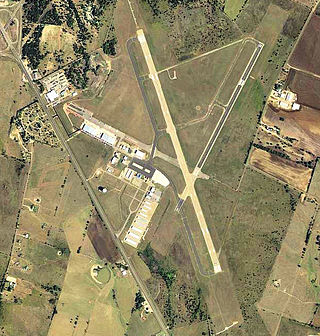
Draughon–Miller Central Texas Regional Airport is six miles northwest of Temple, in Bell County, Texas. The National Plan of Integrated Airport Systems for 2011–2015 categorized it as a general aviation facility.
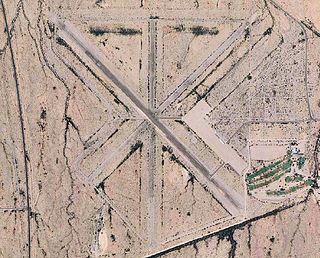
Eric Marcus Municipal Airport is a county-owned, public-use airport in Pima County, Arizona, United States. It is located 5.75 miles north of the central business district of Ajo and is about 82 miles southwest of Phoenix. The airport was renamed on February 11, 2006; it was formerly known as Ajo Municipal Airport.
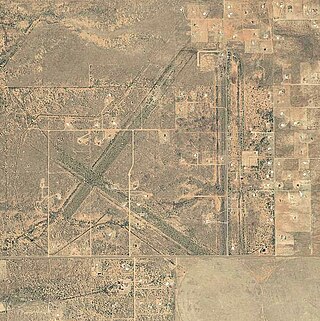
Hereford Army Airfield is an abandoned military airfield located about 2 miles west-southwest of Hereford, Arizona, United States.
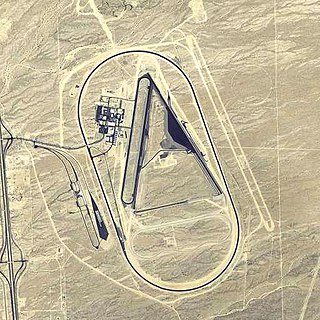
Yucca Army Airfield is a former military airfield located about 1 mile (1.6 km) west of Yucca, in Mohave County, Arizona, United States. It is on the east side of Interstate 40, 25 miles (40 km) south of Kingman. It is now used as a private facility owned by Fiat Chrysler Automobiles named Chrysler Arizona Proving Grounds.

Lemoore Army Air Field, located nine miles (14 km) southwest of Lemoore, California, was a dirt air field usable only in dry weather. It nevertheless was used by the AAF Western Flying Training Command as a processing and training field.

Dalhart Army Air Base is a former World War II military airfield complex near the city of Dalhart, Texas. It operated three training sites for the United States Army Air Forces from 1943 until 1945.

Garden City Army Airfield was a World War II training base of the United States Army Air Forces Central Flying Training Command (CFTC). It is currently the city-owned Garden City Regional Airport.

Henry Tift Myers Airport is a public use airport located two nautical miles (4 km) southeast of the central business district of Tifton, a city in Tift County, Georgia, United States. It is owned by the Tifton & Tift County Airport Authority. This airport is included in the National Plan of Integrated Airport Systems for 2011–2015, which categorized it as a general aviation facility. It does not have scheduled commercial airline service.
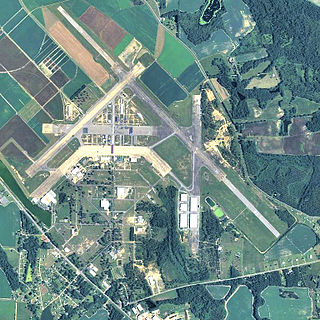
Spence Air Base was a United States Air Force base that operated from 1941 to 1961. It was later reopened as Spence Airport.
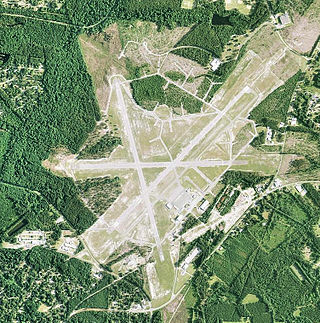
Lowcountry Regional Airport is a public use airport located two nautical miles (4 km) northeast of the central business district of Walterboro, a city in Colleton County, South Carolina, United States. It is owned by the city and county. This airport is included in the National Plan of Integrated Airport Systems for 2011–2015, which categorized it as a general aviation facility. It does not have scheduled commercial airline service.
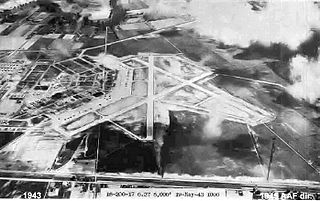
Selman Army Airfield is an inactive United States Air Force base, approximately 7.7 miles east of Monroe, Louisiana. It was active during World War II as an Army Air Forces Training Command airfield. It was closed on 1 September 1945.
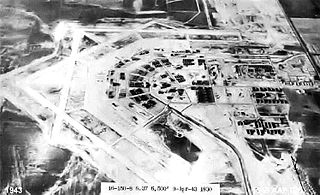
Stuttgart Army Airfield is a former World War II military airfield, located 7 miles north of Stuttgart, Arkansas. It operated as an advanced pilot training school for the United States Army Air Forces from 1942 until 1945.

Anniston Air Force Base is a former United States Air Force airfield located approximately 10 miles north-northeast of Talladega, Alabama. It was active from 1942 to 1945 and 1949 to 1952. It is currently the site of the Talladega Superspeedway and Talladega Municipal Airport.

San Angelo Army Airfield is an inactive United States Air Force base, about 8 miles south-southwest of San Angelo, Texas. It was active during World War II as a training airfield. It was closed on 30 November 1945.
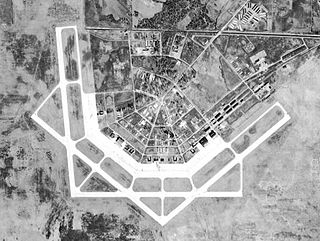
Courtland Army Airfield is a former United States Army facility located two nautical miles northeast of the central business district of Courtland, a town in Lawrence County, Alabama, United States.
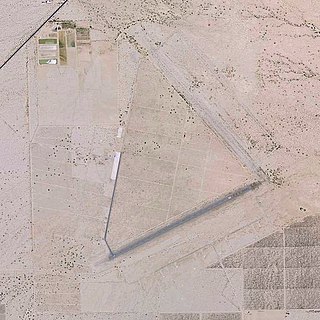
Desert Center Airport is a private-use airport located five nautical miles northeast of the central business district of Desert Center, in Riverside County, California, United States.

Eagle Pass Army Airfield is a former World War II military airfield complex. It is located 10.6 miles (17.1 km) north of Eagle Pass, Texas. It operated as a training base for the United States Army Air Forces from 1943 until 1945.


























